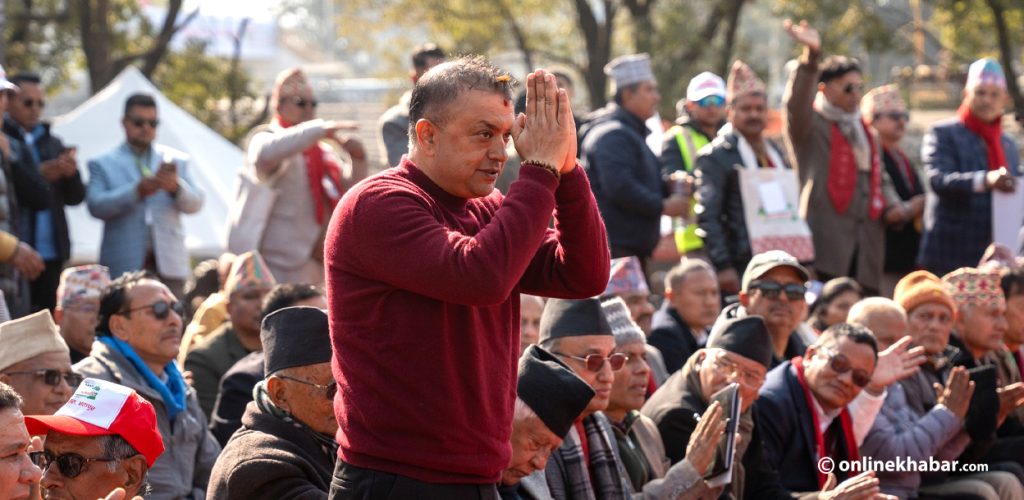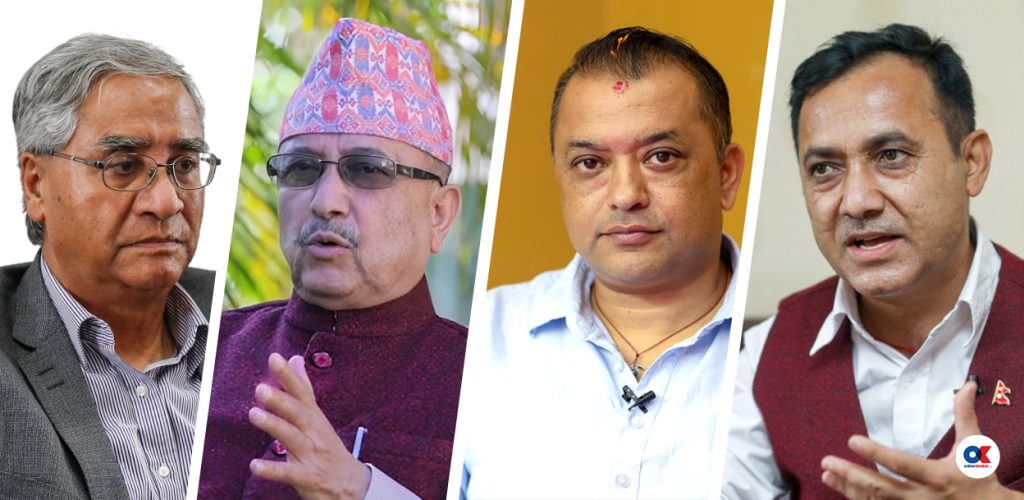
Thousands of Nepalis are taken abroad on visitor visas in order to work without obtaining labour approval from the government. This puts workers in incredibly dangerous situations, vulnerable to abuse and exploitation. Agents and organized groups are facilitating this irregular movement. Worryingly, visit visas are also used as a tool for human trafficking and smuggling.
Recently, the issue has gained attention after Nepal’s constitutional body, the Commission for the Investigation of Abuse of Authority, arrested the head of the Immigration Office along with a few others on suspicion of large-scale bribery for facilitating those traveling abroad on visit visas.
Destination countries issue visit visas for individuals planning to travel to meet relatives or family members, for tourism, or to participate in conferences and seminars. To obtain this visa, the applicant must meet the conditions and criteria set by the respective country. Holders of this visa are allowed to enter the country for purposes other than employment.
Manipulating migration system
Among those Nepalis traveling on visit visas, the majority found to have gone to Gulf countries and Malaysia, which are also major destinations for Nepali seeking employment. For instance, according to records from the Immigration Office, in 2023, out of a total of 132,820 Nepali passport holders travelling on visit visas to 155 countries (excluding India), 50.72 percent (67,367 individuals) went to just seven countries—six Gulf countries (United Arab Emirates, Oman, Qatar, Saudi Arabia, Kuwait, and Bahrain) and Malaysia. Among them, 21,510 were women.
Reports and records from state agencies demonstrate that majority of these people have travelled for work, with a few exceptions for tourism or to visit family. For example, a report by the Ministry of Home Affairs states that during just five months—from August to December 2021, when international travel for tourism was nearly halted due to the COVID-19 pandemic—54,646 individuals travelled to six Gulf countries on visit visas. Given the stop in tourism and the impact on the economy, we can conclude these people were traveling for employment.
The process of formal labor migration from Nepal is neither simple nor hassle-free. It takes a long time to complete the process—from getting labour demand attested through the concerned Nepali embassy, to obtaining pre-approval, beginning recruitment, and finally receiving final approval. In some cases, one or another government body causes delays—not just due to procedural reasons but also intentionally—creating a situation where, according to recruitment agencies, without bribing government officials and political leaders at several step, the process simply cannot move forward. In the case of women, discriminatory and restrictive policies—such as age restrictions or bans on traveling to certain countries or for specific types of work—make it even more difficult for them to migrate through formal manner even when they wanted too. Since hundreds of thousands of people, desperate due to unemployment, are being pushed to go abroad “by any means necessary” — Many among them lack adequate knowledge about which visa is for what, what kind of employment opportunities exist different countries or how to access them — they rely on local agents and recruitment agencies for the entire process.
Some agents and private recruitment agencies in Nepal involved in foreign employment recruitment are neither transparent nor honest. They often deceive aspiring migrant workers about the migration process, the nature of the job, or the salary. Certain recruiters even seek to avoid any future responsibility for illegal fee they charged or to the workers they send abroad even when they are in trouble. In such cases, they take advantage of desperation of individuals affected by unemployment—those with little knowledge of formal migration procedures—by sending them abroad informally for employment, with the intent of making significant profits. This strategy by agents and organized groups is easily materialized when they do a ‘setting’ with government officials who have deviated from their official duties or with political leaders who provide them protection. In other hand, some placement agencies and employers in destination countries are also involved on this to help facilitating the formalities of visit visa issuance and bypass the formal system. Ultimately, the organized groups are successful to send their desperate “clients” abroad outside the formal migration channel.
It has been found that the majority of those taken for employment on visit visas are sent directly through Nepal’s international airport, while the rest are taken to their destination via India using the open border. The 2017 field monitoring report on Gulf countries by the Legislative Parliament’s International Relations and Labor Committee also confirms this, stating: “Among the workers illegally taken to Gulf countries, 60 percent were sent through Nepal’s airport using visit visas or under pre-arranged settings. Immigration officers, security personnel, airline staff, and middlemen working at the airport were found to be directly involved in this illegal activity. The remaining 40 percent were trafficked to the Gulf via various Indian cities, Sri Lanka, China, and other African countries.”
Abuse across borders
Those who send workers abroad on visit visas ‘earn substantial’ profits. According to the Parliamentary Committee’s Report, even when sending workers for domestic work in the Gulf alone, they earn at least NPR 400,000 per worker. Such earning for sending to European countries amounts to at least a million Rupees.
The method to take workers abroad in visit visas allows for faster processing, and the person or group sending the worker does not appear anywhere in official recruitment records. As a result, they can escape any legal responsibility for the large sums of money collected from the workers or in cases where the workers they sent face exploitation or challenges abroad.
Even if they go through formal channels, migrant workers are often subjected to exploitation, forced labor, trafficking, and discrimination at the hands of local agents and recruitment/service-providing agencies in Nepal, as well as placement agencies or employers in the destination countries. Those who migrate through informal or irregular manner, such as on visit visas, face even greater risks due to their ‘undocumented’ status.
Many workers who travel on visit visas are found stranded abroad without being provided employment. Among those employed too, many suffer from various forms of exploitation, forced labor, discrimination, and even trafficking. In such situations, workers often find it impossible to change employers or return home. Additionally, they are at constant risk of being arrested, fined, or severe punishment in the destination country at any time. While such abuses can affect any worker, women are particularly at greater risk due to gender-based vulnerabilities.
For those who travel or are taken abroad informally for employment, basic information—such as their current situation or who their employer is—is often not available to the relevant authorities of the Government of Nepal. As a result, when these workers face abuse, accidents, or other unfortunate events, they are often deprived of humanitarian assistance and legal protection. Even if they die abroad, their families are unable to receive insurance or any form of financial support. Despite this reality being well known, organized groups have continued to send thousands of workers abroad on visit visas for years.
The Government of Nepal is well aware of the risks faced by workers taken abroad on visit visas and has, on several occasions, conducted studies claiming to address the issue. From the formation of a Rapid Action Taskforce in September 2012 to monitor ‘airport setting’ during foreign labour migration processes, to a taskforce in March 2017 under the direct initiative of the then Prime Minister to find a ‘solution in package’ to problems related to visit visas and foreign employment, various efforts have continued through successive labor and home ministers. In addition, the government has issued policies and directives from time to time. However, these efforts have largely focused not on controlling middlemen and irregular practices by government officials, but rather on imposing one restriction after another on citizens.
If Nepali citizens wish to travel to a country for tourism or other purposes, it is the destination country—not the Government of Nepal—that sets conditions for entry. However, looking at Nepal’s procedures and directives, it appears the Government of Nepal itself is the body deciding whether to issue visas on behalf of destination countries. Procedures and Directives related to visit visas impose numerous conditions on individuals wishing to travel abroad for various purposes. These include requiring proof of high-income employment, prior foreign travel experience, family members residing in the destination country, fluency in English or another internationally spoken language of that country, and completion of at least Grade 12 or an equivalent level of education. Similarly, individuals planning to travel must obtain prior approval from the Department of Immigration even before purchasing airline tickets. Travel agencies arranging the tickets must verify whether the traveller has received government approval to visit that country before issuing a ticket. Agencies are also required to ensure that travellers went through them return to Nepal on the specified date and submit a report to the Immigration Department. Such impractical and cumbersome conditions not only restrict the freedom of most people from traveling abroad but also undermine the rights of citizens to enter or return from a foreign country—even when the destination country has granted them a visa.
The government’s ‘fragile’ policies have given immigration officers the discretion to allow or deny foreign travel based on personal bias—permitting those they favor to travel and blocking those they do not. At the same time, these weak policies have allowed agents and organized groups to bypass formal labor migration procedures and, in collusion with officials, “fish in troubled waters.” A taskforce formed by the Ministry of Home Affairs acknowledged this in its study report, stating: “Due to the lack of clarity, objectivity, and practicality in the existing legal provisions regarding the use of visit visas, it has been found that middlemen are taking undue advantage—misusing visit visas to send workers seeking foreign employment to Gulf and other countries, where many end up stranded or exploited.”
The way forward

To protect Nepali workers who are being pushed into risk due to the misuse of visit visas, the Government of Nepal must reform the system rather than simply impose impractical and inappropriate conditions on its citizens. This requires removing the hassles and obstacles in the formal labor migration process to make it smoother and more effective; lifting discriminatory restrictions on female migrant workers; eliminating unnecessary and unrealistic conditions for travelling on visit visas; controlling the corruption and irregularities within the immigration system; bringing those involved in exploitation and abuse under legal accountability; and providing accurate information and necessary support to those wishing to go abroad.
In addition, strengthening labor diplomacy and diplomatic engagement with destination countries is equally important. If these measures are implemented, the current problems created by the misuse of visit visas can be significantly addressed.





















